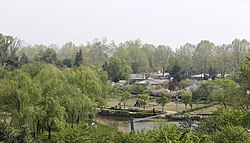You can help expand this article with text translated from the corresponding article in Korean. (January 2015) Click for important translation instructions.
|
| Yongsan Family Park | |
|---|---|
 | |
| Type | Public |
| Location | Yongsan District, Seoul |
| Coordinates | 37°31′22″N 126°59′01″E / 37.52278°N 126.98361°E / 37.52278; 126.98361 |
| Area | 75.900 hectares (187.55 acres) |
| Established | November 1992 (1992-11) |
| Open | All hours, every day |
| Parking | Onsite (50 spaces) |
| Website | www |
| Korean name | |
| Hangul | 용산가족공원 |
| Hanja | 龍山家族公園 |
| Revised Romanization | Yongsan Gajok Gongwon |
| McCune–Reischauer | Yongsan Kajok Kongwŏn |
Yongsan Family Park (Korean: 용산가족공원) is a park in Yongsan District, Seoul, South Korea. It is also known as Yongsan Park (용산공원).
The area of the park is 75,900 square metres (817,000 sq ft). It has a 2 km (1.2 mi) walking path and a variety of facilities, including Taegeukgi Park in the center. Pigeons and wild pheasants live in the park. Several ponds and lakes are in the park. It is open throughout the year, at all hours. There is a path in the park where guests are intended to walk it barefoot. It has a texture that is meant to perform acupressure on your feet.
During the Japanese colonial period, the park was used as a Japanese military facility from 1906 to the liberation of Korea in 1945. It was part of the US military base Yongsan Garrison, the headquarters of the US military in South Korea after the Korean war, including the base golf course. In December 1988, efforts began to convert the area into a civilian park via a presidential decree. The park opened in November 1992.
It is accessible from Ichon station on line number 2 and Seobinggo station on line number 1.
References
- ^ 용산가족공원. parks.seoul.go.kr. Retrieved 2023-09-17.
- ^ "Yongsan Family Park (용산가족공원)". VisitKorea.or.kr. Retrieved 2023-09-17.
- Si-jin, Kim Hae-yeon;Hwang Joo-young;Lee (2023-08-31). "[Well-curated] Plant hospital, Joseon-era wedding and Yongsan Family Park". The Korea Herald. Retrieved 2023-09-17.
{{cite web}}: CS1 maint: multiple names: authors list (link) - ^ 용산가족공원. korean.visitseoul.net (in Korean). Retrieved 2023-09-17.
- 서울기록원. 서울기록원 웹사이트 (in Korean). Retrieved 2023-09-17.
External links
This Seoul location article is a stub. You can help Misplaced Pages by expanding it. |